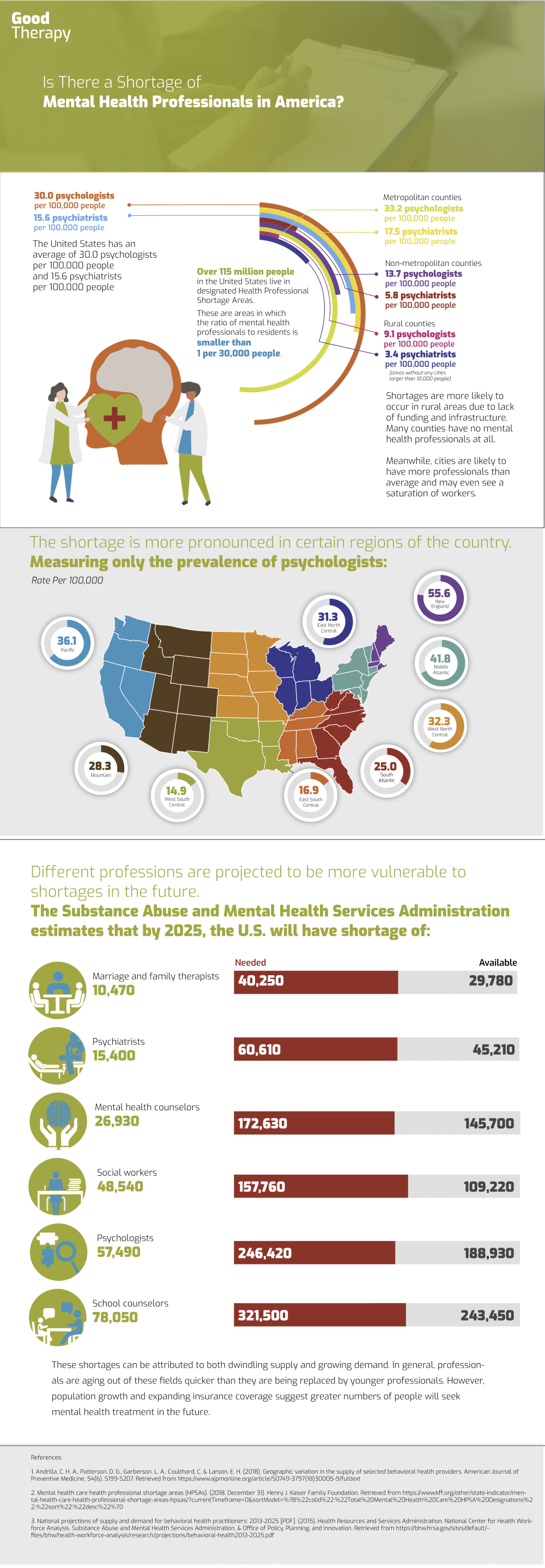
INFOGRAPHIC TEXT: IS THERE A SHORTAGE OF MENTAL HEALTH PROFESSIONALS IN AMERICA?
Treatment Access in Urban vs. Rural Counties
Over 115 million people in the United States live in designated Health Professional Shortage Areas. These are areas in which the ratio of mental health professionals to residents is smaller than 1 per 30,000 people.
- The United States has an average of
- 30.0 psychologists per 100,000 people
- 15.6 psychiatrists per 100,000 people
- Metropolitan counties have an average of
- 33.2 psychologists per 100,000 people
- 17.5 psychiatrists per 100,000 people
- Non-metropolitan counties have an average of
- 13.7 psychologists per 100,000 people
- 5.8 psychiatrists per 100,000 people
- Rural counties (areas without any cities larger than 10,000 people) have an average of
- 9.1 psychologists per 100,000 people
- 3.4 psychiatrists per 100,000 people
Shortages are more likely to occur in rural areas due to lack of funding and infrastructure. Many counties have no mental health professionals at all. Meanwhile, cities are likely to have more professionals than average and may even see a saturation of workers.
Which Regions in America Have the Most Providers?
The shortage is more pronounced in certain regions of the country. Measuring only the prevalence of psychologists:
- New England: 55.6 per 100,000
- Middle Atlantic: 41.8 per 100,000
- East North Central: 31.3 per 100,000
- West North Central: 32.3 per 100,000
- South Atlantic: 25.0 per 100,000
- East South Central: 16.9 per 100,000
- West South Central: 14.9 per 100,000
- Mountain: 28.3 per 100,000
- Pacific: 36.1 per 100,000
Concerns for the Future: Which Professions Are Most At Risk?
Different professions are projected to be more vulnerable to shortages in the future. The Substance Abuse and Mental Health Services Administration estimates that by 2025, the U.S. will have a shortage of:
- 10,470 marriage and family therapists (40,250 needed; 29,780 available)
- 15,400 psychiatrists (60,610 needed; 45,210 available)
- 26,930 mental health counselors (172,630 needed; 145,700 available)
- 48,540 social workers (157,760 needed; 109,220 available)
- 57,490 psychologists (246,420 needed; 188,930 available)
- 78,050 school counselors (321,500 needed; 243,450 available)
These shortages can be attributed to both dwindling supply and growing demand. In general, professionals are aging out of these fields quicker than they are being replaced by younger professionals. However, population growth and expanding insurance coverage suggest greater numbers of people will seek mental health treatment in the future.
If you are studying to become a mental health professional, consider getting a free student membership with GoodTherapy. Licensed professionals who want to advertise their practice or get continuing education credits can benefit from one of GoodTherapy's paid membership programs.


.png)